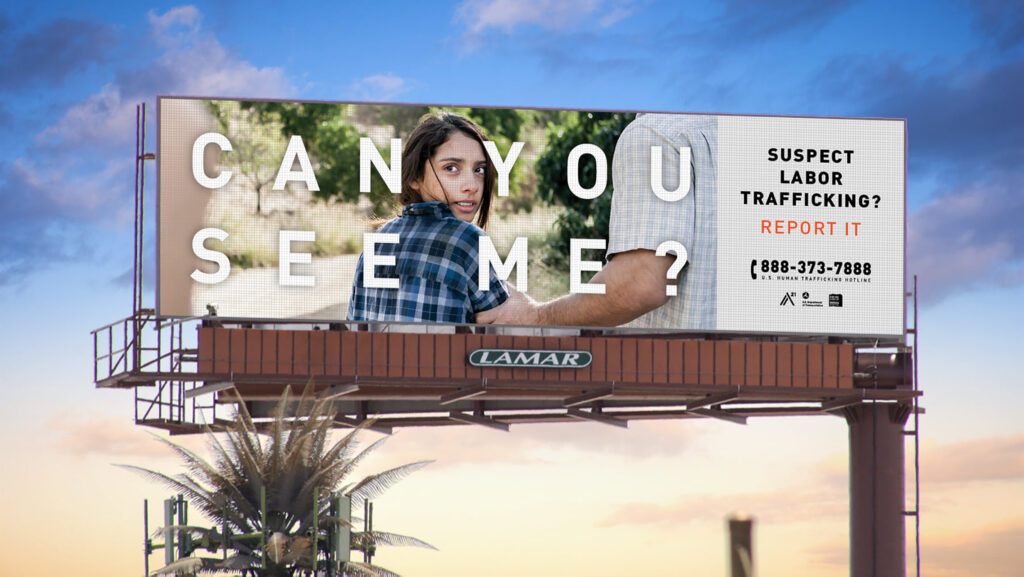BY PRESIDENTIAL PROCLAMATION, January 2021 is
National Slavery and Human Trafficking Prevention Month
If you resolve to do even one thing to mark National Slavery and Human Trafficking Prevention Month, the single best action you can take is to learn how to spot the signs of trafficking.
THE PROBLEM
Right now, people are being bought and sold against their will in every country around the world. This illegal trade, recruitment, control, and use of people for their bodies and labor is called Human Trafficking. At $150 billion a year, it is the world’s fastest-growing criminal enterprise; a criminal can only sell a drug or a weapon one time, but he can sell a person indefinitely.
The Attorney General of Texas reports, at any given time, there are 79,000 child and 155,000 adult victims in our state alone. Across the globe, there are more individuals enslaved today than any other time in history; 5.4 out of every 1,000 people. But, thanks to organizations like A21, slavery is more stoppable than ever before.
THE SOLUTION

Since 2008, Christine Caine and her husband Nick have been working to do the impossible; create a world where men and women are no longer sold for labor or sex, and children are not exploited. As founders of A21, they developed a global strategy to reach the vulnerable, rescue the victims, and restore survivors.
Close to home, Michelle Parrozzo, A21 Senior Advisor of Strategic Partnerships, lives in Georgetown and says the organization employs a holistic approach to breaking the cycle of trafficking.
“Reach is about preventing trafficking before it happens. A21 has curricula in place that are customized by region and country; one such program is written to Texas core education standards, and we are eager for any opportunities to share with Georgetown schools and community organizations.”
Michelle explains the importance of recognizing the signs, and A21 provides examples of awareness to help students recognize when a person is being trafficked, including themselves; e.g., having limited freedom of movement or no access to medical care. They are also taught to recognize when they are being approached or groomed on social media. “It is difficult to quantify the results of prevention,” she says. “By continuing to equip people with information they need to stay safe—we believe we will continue to see vulnerable people avoid situations of trafficking. Following, victim identification and assistance will increase, and survivors will be restored.”
CAN YOU SEE ME?

To assist in that recognition, A21 offers many free and online videos that demonstrate common scenarios of trafficking, which equip people everywhere to be a part of the solution. This awareness campaign, Can You See Me?, is reaching millions of people, across several countries, every day.
Within six months of launching this campaign in the U.K., A21 reported a 400 percent increase in hotline calls. Additionally, several investigations by law enforcement led to raids and the identification of trafficked victims. This success led to the campaign’s expansion into new locations in the U.S., South Africa, Mexico, and Thailand.
In 2019, the campaign arrived in Texas (photo next page), with support and cooperation from Texas First Lady Cecilia Abbott, Clear Channel Outdoors, law enforcement, and Senator Ted Cruz.
Trafficking happens to people who are vulnerable because no one is looking for them.
“It’s not like you see in the movies,” Michelle says. “It is much less common for people to be abducted in dramatic ways; it often involves deceptive tactics.” Common examples are women and men ‘hired’ by foreign businesses for what they believe are legitimate jobs, but when they arrive at the new workplace, their passports are taken and they are trafficked for sex or labor. Another tactic is the ‘loverboy’ approach, in which an isolated teen thinks she has finally found someone who cares for her but, over time, her ‘boyfriend’ takes increasing control over her life and eventually sells her for sex. Since deception is a key tactic for traffickers, education and awareness makes a difference.
“The Reach aspect of our mission is super important,” Michelle adds. “If we can stop trafficking before it happens, we can prevent people from ever experiencing this horrific abuse.”
RESCUE
A21 works with local authorities in 13 countries to set victims free and also supports survivors who have bravely managed to escape on their own. According to Michelle, regardless of how a person came out of trafficking, A21 supports survivors through the legal process to hold traffickers accountable.
RESTORE
A21’s restoration goal is to set survivors up for independence; working with each individual to provide tailored care plans designed around their goals and dreams. “Restoration is a process,” Michelle says. “In some cases, it can take months or years to regain independence. But this stage is so important; it equips survivors to take steps toward the life they want. For some, that might be going back to school and completing their education, for others it’s being reunited with family, starting their own business, or getting a job. And, at the core of this restoration strategy is the Freedom Center.”
The Freedom Center is a drop-in day center that provides survivors access to services like counseling, life skills courses, job training, health services, and more. For their efforts, A21’s Freedom Center in North Carolina received the 2020 Presidential Award for Extraordinary Efforts in Combatting Trafficking in Persons, which is annually awarded by the State Department.
Here in Georgetown, The Key2Free (TheKey2Free.org) is committed to the mission to prevent and end sex trafficking through education, awareness, and aftercare for survivors. Our local non-profit is dedicated to restoring survivors to healthy lives and a place where they can hope again.
Co-founded by Executive Director Amy Davis, The Key2Free works independently and also within a network of more than 100 regional organizations to create a safe, quality environment, provide access and referrals to community-based services, and educate the public and at-risk youth about trafficking.
The Key2Free also provides safe housing for adult females, and non-residential services to a fully diverse demographic. All services are free to clients, including case management, medical referrals and counseling services, life skills classes, and educational support such as earning their GED or acquiring their driver’s license.
Another restoration arm is the Sanctuary Project in Austin (SanctuaryProject.com), which provides meaningful employment and job training to women who have survived trafficking. Founded and run by survivors, the Project supports women in transition by teaching practical skills in jewelry making. Retail sales then provide revenue and profit, which allow the agency to be self-sustaining while creating future job opportunities and growth.
WHAT YOU CAN DO
Visit A21.org/GetInvolved for resources and ways to make a difference. Educate yourself on what human trafficking looks like by taking A21’s Human Trafficking eCourse, hosting a local fundraising event to bolster awareness in your own community, or donate to be a part of A21’s global restoration work.
WHAT TO LOOK FOR
In the United States, trafficking often begins with grooming online or as a normal interaction. Michelle says, “A person pretends to be your age, promises to spend money on you, then asks you do to something ‘just this once.’ After that, he will threaten to tell parents or family that you’ve done something shameful unless you continue doing it. They lull you into a mental state from which you can’t escape, even though you’ve never left the safety of your own room.” She adds that, with COVID, online grooming is on the rise, as people spend more and more time in virtual conversation, commerce, and job searches, “We need to be vigilant as it is happening in plain sight”.
Georgetown Police Sgt. Jamieson Allen says, “With the Internet, the potential threat pool is everyone on the planet with a phone. When it comes to your child’s safety, it is not snooping to read his or her chats and messages on games, Facebook, and Instagram.”
RED FLAGS
- Take note of messages clearly not written by native English speakers, or using language that seems inappropriate for the writer’s alleged age or situation.
- Conversations start with a simple “Friend me” in a social media platform or online game. They engage, console, and compliment; then steer to other things.
- Insist children never accept a friend request, share phone numbers, or agree to meet with someone you do not know personally.
- Snapchat deletes photos, but criminals will screen- grab, or take a photo of the photo with another phone.
- Predators create programs to alert them when new members arrive in chat areas, or when keywords are typed; anything that indicates a person is looking for online affirmation, which they can exploit.
People being trafficked may…
- Be fearful of police/authorities.
- Struggle to speak English words not related to labor or sex-related topics.
- Exhibit signs of physical and psychological trauma e.g. anxiety, lack of memory of recent events, bruising, addictions, untreated conditions.
- Be fearful of telling others about their situation.
- Be unaware they have been trafficked and believe they are simply in a bad job.
- Have limited freedom of movement; always brought to and picked up from work by others.
- Be unpaid or paid very little.
- Have few or no personal belongings; wear the same clothing most of the time.
- Seem to be in debt to someone, or unusually attached to a person who never leaves them alone.
CALL 888-373-7888 • TEXT “HELP” or “INFO” to 233-733
VISIT Report.Cybertip.org
